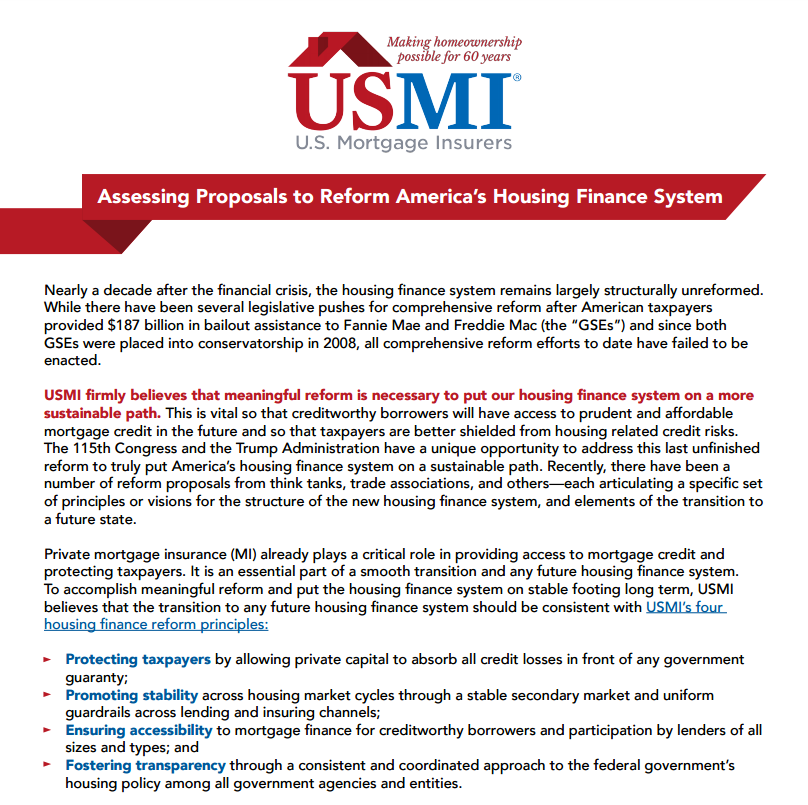Here is a roundup of recent news in the housing finance industry. USMI released a paper assessing housing finance reform proposals announced by housing institutions and organizations, the Senate Banking Committee held a hearing on housing finance reform, Genworth Financial introduced its first-ever First-Time Homebuyer Market Report, the Federal Housing Finance Agency (FHFA) submitted its 2016 annual report to Congress, and American Action Forum (AAF) commented on Fannie Mae and Freddie Mac’s (the GSEs) increasingly risky credit portfolios while calling for greater usage of private mortgage insurance (MI).
- USMI Releases Policy Paper Assessing Housing Finance Reform Proposals. USMI released a paper that assesses a number of reform proposals for the housing finance system. This paper analyzes the various reform proposals put forth by widely respected institutions and organizations through the lens of USMI’s housing finance reform principles, with attention to the role of private capital to protect against taxpayer risk exposure in the proposed new systems.
- Senate Banking Committee Holds Hearing on Housing Finance Reform. Edward DeMarco (President, Housing Policy Council), Dave Stevens (President, Mortgage Bankers Association), and Michael Calhoun (President, Center for Responsible Lending) testified before the Senate Banking Committee on principles for housing finance reform and specific proposals, including the importance of more private capital standing in front of taxpayers’ risk exposure.
- Genworth Introduces First-Time Homebuyer Market Report. Genworth introduced its First-Time Homebuyer Market Report – the first economic series focused on first-time homebuyer market size. The report provides data spanning two housing cycles over the past 24 years that will make the first-time homebuyer market more visible to housing industry participants and policymakers. A factsheet of the report can be found here.
- FHFA Submits 2016 Annual Report to Congress. FHFA submitted its annual Report to Congress for 2016, which describes the actions undertaken by the agency to carry out its statutory responsibilities. The report summarizes the findings of FHFA’s 2016 examinations of the GSEs as well as FHFA’s actions as conservator of the GSEs during 2016. The report also describes FHFA’s regulatory guidance, research, and publications issued during the year.
- AAF Comments on GSEs’ Increasingly Risky Credit Transfers. In a post on its website, AAF commented on the current status of FHFA and the GSEs, which are retaining risky assets and transferring very little credit risk while remaining dangerously undercapitalized. AAF warns that FHFA and the GSEs’ actions will most likely lead to another taxpayer bailout of the entities. AAF notes that while GSE reform remains a top priority to fix the housing finance system, private MI can be more extensively used in credit risk transfer to de-risk the GSEs’ portfolios, which in turn will protect US taxpayers and the federal government.










